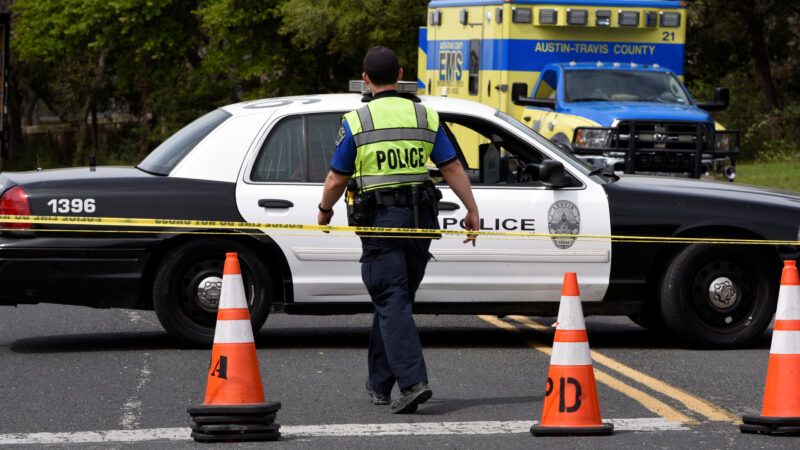No Qualified Immunity for Cop Who Shot and Killed a Suicidal Man, Says Federal Court
“An officer violates the Fourth Amendment if he shoots an unarmed, incapacitated suspect who is moving away from everyone present at the scene.”

Albina Roque called 911 on May 2, 2017, to report that her son, Jason, was threatening to kill himself. When officers from the Austin Police Department arrived on the scene, Jason was pacing in front of his house, with a black gun—later determined to be a BB gun—in his waistband. "I'll fucking kill myself!" Roque said as he turned away from the officers and pointed the gun at his head.
"Put the gun down," yelled one of the officers. Video footage shows what happened next: As Roque began turning back towards the officers, with the BB gun raised in the air, he was shot by Officer James Harvel. That shot caused Roque to drop the gun. Harvel then quickly fired twice more. The third shot killed Roque.
Roque's parents sued Harvel in federal court for using excessive force against their late son in violation of his Fourth Amendment rights. Harvel countered by invoking the controversial doctrine of qualified immunity, which shields state officials from being held civilly liable if the actions that they are being sued over did not violate a "clearly established" constitutional right.
In a ruling issued this week, the U.S. Court of Appeals for the 5th Circuit denied qualified immunity to the officer who fired the fatal shot. "By 2017, it was clearly established—and possibly even obvious," wrote Judge Don Willett in Roque v. Harvel, "that an officer violates the Fourth Amendment if he shoots an unarmed, incapacitated suspect who is moving away from everyone present at the scene."
In Tennessee v. Garner (1985), the U.S. Supreme Court said that a "police officer may not seize an unarmed, nondangerous suspect by shooting him dead." Harvel and his lawyers argued that the present case is different. "All of the officers," they maintained, "including Officer Harvel, believed that after the first shot, Roque was still armed. Roque was not compliant with police commands, was not running away or surrendering, but was armed, mobile, and capable of firing his weapon at his mother."
The 5th Circuit took a different view. "As the video indisputably shows, [Roque] was unarmed and stumbling into the street, moving further away from anyone else," after Harvel shot him the first time. "Whether a reasonable officer would have thought Jason was incapacitated or a threat to his mother," the Court held, "is a question for the jury to decide."
It's a welcome result. All too often, the federal courts seem to go out of their way to defer to law enforcement in such cases. With qualified immunity denied to the officer here, this case is one big step closer to trial.


Show Comments (28)